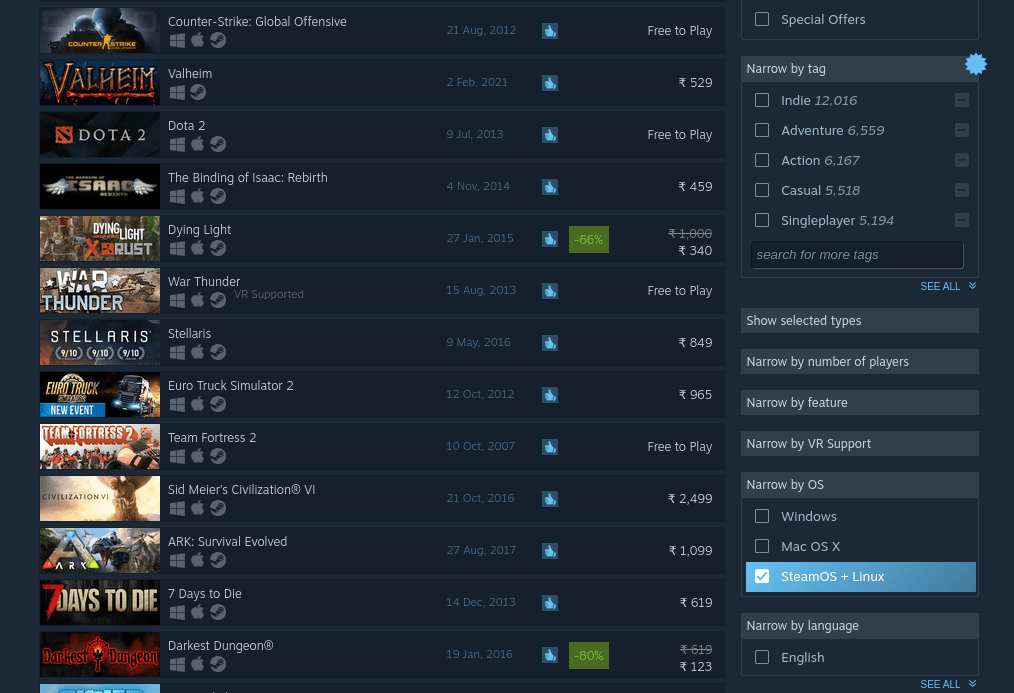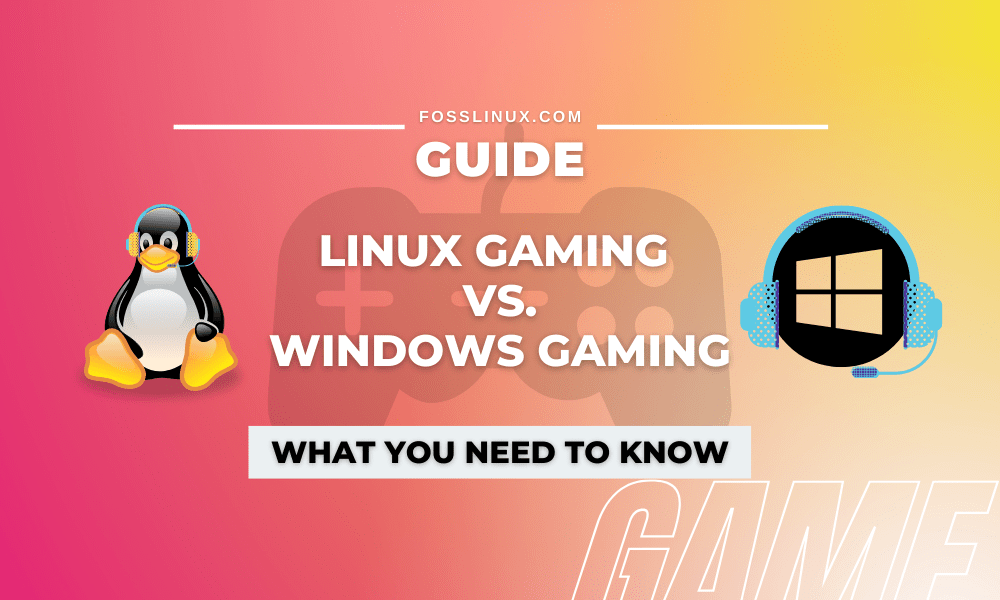Linux has made significant strides over the last couple of years when it comes to gaming. But has it reached the stage where it can be considered as a viable alternative to Windows? Well, the answer depends on you – what games you play and how you use your OS apart from gaming.
If you are looking for the OS with the most natively supported games, then Windows takes the cake – no argument!
However, it’s more than likely you don’t plan on playing “every” PC game out there! Maybe you have a few favorites! And Linux’s gaming catalog covers almost all the popular titles, so you are extremely likely to find your favorite game compatible on Linux. Also, believe it or not, but some games actually perform better on Linux than Windows – provided you are running on the same hardware.
As such, it’s clearly understandable why the PC gaming community is constantly engaged in a heated debate over Linux vs. Windows gaming – which is better. And so, for this read, we have decided to shed some light on the topic – giving you the pros and cons of both OSes in terms of gaming.
Linux Gaming vs. Windows Gaming
1. OS Price

Pricing
So you are building a new gaming rig and want to know which OS to pick for Linux or Windows! Well, Linux is totally free, whereas Windows will cost you at least $140 (and that too for Windows 10 Home and not Pro)- money you could have otherwise spent on better gaming parts and peripherals.
Now I know what you are thinking – “what’s this guy talking about – Windows is free!” And yeah, Windows is free – sort of! Microsoft offers a Windows 10 Media Creation Tool on their website that allows you to download and install an unactivated “trial” version of Windows 10 on your system. Even Linus from Linux Tech Tips uses unactivated Windows 10!
However, the biggest annoyance with running an unactivated copy of Windows 10 is the omnipresent “Activate Windows” watermark. Even while playing games, this watermark will sit at the bottom right corner of the screen – and frankly, it’s super irritating. And not just that, but you also have limited (read: next to none) Windows customization features without updating.
Again, some of the more “resourceful” readers might point out that there’s the KMS tool for Windows activation – but it’s illegal and might even introduce viruses and vulnerabilities into your system!
With Linux, there are none of these problems! It’s completely free, with no strings attached.
Winner: Linux. You can’t beat free!
2. Game Availability

Linux Compatible Games on Steam
In terms of sheer game availability, Windows takes the cake. Not only does Windows natively support thousands of titles, but you can rest assured that all the latest AAA PC games will be supported on Windows 10.
That being said, Linux does support many of the popular titles. Around 76% of the top 1000 steam games have a gold rating (runs perfectly with minor modifications) in terms of compatibility, with 20% of the titles natively supported. And not just Steam, you can even play games from other sources like Origin, Uplay, Epic Games, and tons more by using Lutris.
Recommended Reading: The Ultimate Linux Gaming Guide – where and how to find games compatible on Linux.
Furthermore, game developers are slowly turning their attention to Linux, and it’s not long till we see AAA titles simultaneously releasing for both Windows and Linux. Much of this is thanks to all the major Cloud Gaming Services being built on Linux.
As such, as we advance, Linux should play almost any PC game out there. But for now, Windows still holds the throne!
Winner: Windows – for now!
3. System Setup

System Set-Up
With Windows, gaming is more or less a “plug and play” ordeal. You download/install the game you like, hit the play button, and that’s it! This is because most of the PC games are “natively supported” on Windows.
As we discussed in the above section, many of the titles are also “natively supported” on Linux. And yes, you can play these games without any additional set-ups or tweaks!
However, a good chunk of the Linux-supported titles will require some extra labor from your end. This includes downloading some additional dependencies, installing a few ports, and the likes. If you’re already a Linux user, you should be somewhat familiar with this stuff, as these are necessary to install some apps.
The good news is that there are tons of detailed guides and tutorials to help you configure your system to make the games run. So you aren’t in it alone! The community is big, helpful, and just awesome! Also, there are dedicated Linux gaming distros that ship with all the latest drivers, packages, and dependencies necessary for gaming.
But all things considered, for the layman – a person who wants an OS to play their games and nothing more, Windows is the more convenient option as it’s plug and play.
Winner: Windows – Albeit if you’re already familiar with Linux, the extra set-up processes aren’t too big of a deal.
4. Performance

Performance
This is a tricky one!
Generally speaking, in terms of performance, Linux takes the win over Windows by a long shot.
The current consensus in the Windows community is that you need at least 8 GB of RAM to enjoy a respectable computing experience. And let’s not leave out the fact that if a Windows system is older than 3-4 years, it’s going to be as slow as a slug.
On the flip side, Linux runs perfectly fine on old hardware. In fact, you can expect smooth performance with an Intel Dual-Core Pentium processor backed by just 2GB of RAM. That’s how light and efficient Linux is when compared to Windows.
However, this performance doesn’t very well translate itself to gaming. This is because if you are not running a game that’s natively supported on Linux, then you are running it through a compatibility layer such as WINE or Proton. This eats up some of the system resources, which inadvertently affects game performance.
But that being said, it’s not all too bad! For some niche gamers, Linux actually offers better performance compared to Windows.
A prime example of this is if you are a retro gamer – primarily playing 16bit titles. With WINE, you will get better compatibility and stability while playing these titles than playing it straight up on Windows.
Furthermore, thanks to Valve’s ACO shader compiler, some modern titles actually perform better with noticeably higher FPS than Windows. And that’s even when you run the games on compatibility layers like Proton. Now granted, this is only available on AMD graphics cards, but it’s still something.
Read: The Ultimate Linux Gaming Guide – We talk about how to optimize your Linux PC for the best gaming performance.
Nvidia Graphics Drivers – because of their proprietary non-open-source nature – aren’t as good on Linux as they could potentially be. But the good news is that Nvidia is working on it. They have been rolling out some patches and extensions here and there, which means, in the future, we could finally see optimized Nvidia drivers for Linux.
At the end of the day, if you are looking at performance, it depends on which games you plan to play. If you are running an AMD graphics card and mainly play games that are already natively supported on Linux, you will get better performance and higher FPS if you switch over from Windows.
Winner: You tell us – Here, performance is actually dependent on the games you play. But that being said, it’s pretty clear that the future is Linux.
5. Privacy & Security

Security and Privacy
One might say that privacy & security aren’t important to gamers, but “one” is wrong!
Just imagine if your system got infected with keylogger malware. Now, when you type in your username and password for Steam or Battle.net, a hacker will get your login credentials. Your gaming accounts, where you spend hundreds (some even thousands) of dollars, all got stolen, including your progress on the games.
Or let’s say you’re chatting with your friends on Discord. But somehow, because of malware or system vulnerability, a hacker can spy in on your conversation. What if they hear something important?
And let’s not leave out the most obvious issues like getting your computer rendered useless by things like ransomware. Even a simple virus can drastically increase system resource consumption such that your games won’t even open.
All of these things can happen, which is why no computer user should ever take privacy and security lightly – even gamers.
Now on Windows, the most simple way to stop these things from happening is by installing an Anti-Virus. But as the anti-virus runs in the background, it eats up a part of your system resources, which will limit your optimal gaming experience.
On the flip side, Linux doesn’t need antivirus! First of all, there aren’t as many viruses developed for Linux, so your chances of running into one are next to nil. Furthermore, Linux is built in such a way that viruses, malware, or any foreign and malicious scripts, for that matter, won’t run without your explicit authentication.
Not just that, but the Linux kernel has a built-in firewall called iptables that can be easily programmed through apps like UFW (Uncomplicated FireWall), which will prevent all incoming traffic to your system, thereby keeping you safe from any hackers.
This makes Linux the safest operating system out there, period!
Winner: Linux
Linux Gaming vs. Windows Gaming: Who Wins?
So that pretty much covers the main differences between Linux gaming vs. Windows gaming. As you can clearly see, Linux is the more cost-effective (it’s free after all) and secure operating system, but it’s in its budding years when it comes to gaming.
The potential is clearly present, and Linux has a bright future ahead when it comes to gaming. But right here, right now, objectively, Windows is still the better operating system for gaming – the keyword being “objectively.”
If you don’t know a user and they ask what’s the best operating system for gaming, you would point them towards Windows because of the availability of the latest games and the overall hassle-free experience.
However, let’s say the user is a niche gamer that only plays titles like CS: GO or Dota 2, then Linux is the OS of choice. And it would help if you didn’t think Linux gaming means playing less graphically demanding games. Graphics-intensive titles like GTA 5, Witcher 3, Shadow of Tomb Raider, Shadow of Mordor, and many run perfectly smooth on the OS.
The Linux gaming space isn’t as bleak as people make it out to be. The most important part of gaming on Linux is that you should be willing to do some research.
Go to ProtonDB and find out which games properly run on Linux. They will also tell you the necessary tweaks you need to make to your system, so just read and apply. Also, if you play games that are compatible with ACO, you can expect better performance on Linux than on Windows.
So which OS do you play games on – Linux or Windows? Let us know in the comments below!


11 comments
Linux. You can’t beat free!
Seriously? To make hassle for $10 Windows when a good game is $50 on average?
But for now, Windows still holds the throne!
Seriously? Still? When Linux has NO own game development platform, nor has plans to create at least one. A nice joke.
It’s pretty clear that the future is Linux.
Seriously? Check Steam for the downfall of Linux adoption for gaming, the peak is in the past.
This makes Linux the safest operating system out there, period!
Seriously? In a totally connected Internet world, safety is overrated, no matter the OS.
I’ve waited 20 years Linux to become a game platform, but I’ve returned to Windows – just for gaming and VR.
My illusion seeing Linux as a game platform evaporated, sorry.
sad but true
Windows 10 home is $140, $200 for pro. Don’t even get me started on the enterprise levels…
Linux absolutely has gaming platforms, maybe take the 3 seconds to look into it a bit next time?
Linux compatibility has never been more expansive, and now with the steamdeck (running steamos, a linux distro) it’ll only go higher.
‘Safety is overrated’ – The statement of someone who has an IQ lower than room temperature.
I have to tell everyone right up, Linux gaming in bottles. All my EA games work, my saitek x52 works except my hat switch and that is very important when it comes to everything with wings or wheels, I have managed to play with the x52 using my stick and throttle, little setback from what I have been accustomed to, since bf1942. g0merpile
The good note , the scaling in linux is way better, I mean larger, gaming is more like what you would see on console. The game play is much faster then winblows. All my EA games work well and installed the EA Launcher with the preset for the bottles. Works flawless. I have no reason to roll back to winblows.
I have use my sumsung m.2 drive to do a custom install of linux mint cinnamon
512gb drive partition is
EFI 550 MB
ext4/ 508250mb
swap 3200mb
biosgrub remander
Setup something else
IMPORTANT: Make sure at the bottom you select your boot loader to be the EFI partition, dev/sdc or what ever your selected drive is. Good luck and see you on the battlefield
I7770k
Asus Rog hero xi MB
16gb samsung rgb 3200hz memory
2-MSI game edition 1080
liquid cooled
Linux might have a chance to be a future for gaming if Linux would get more popular and get more users.
As a game developer, it doesn’t make sense to make a game for Linux, the amount of work you have to put into it compared to the amount of people playing it on Linux doesn’t match.
But to rise popularity, Linux needs to be less complex, easier for beginners and concentrate more on making one good working OS, instead of thousands that have different problems. Then Nvidia, Intel & Amd could also make better drivers if the extra effort would pay off better.
And create a system where everything works without that console/terminal. Cause i can’t recommend Linux to any user who is not very experienced in using a computer, if they need to write stuff in a terminal to get things to work.
Companies like Valve are reaching out to you Linuxers, but nothing changes.
Debian-based distros are the beginner friendly version of linux. Most install can be made within Snap store or by downloading .deb packages then double-clicking them (altough, let’s be real… There’s better package manager than Snap store but requires the terminal, I agree) .
For games downloads, I believe steam is in Snap Store and Lutris makes installing games pretty easy. I’d recommand Debian-based distros over windows to anyone who’s enthiusastic about computers due to it’s learning curve as it’s more lightweight than windows, offers more control on your system and are less bloated out of the box.
APT also has a GUI prompt for any updates.
Drivers needs to be simpler to install for beginners, though. I believe a gaming-linux distro could be doable with steam and lutris installed out-of the box, hardware detection for proper driver-installation when installing linux (AMD vs Intel vs NVidia drivers), wine and proton.
Linux installs are also easier to manage (having everything in a single directory instead of files everywhere in the hard drive like Windows does with Program Files, Program Files x86, $User/doccuments/AppData etc).
What a joke post.
I’ve waited 30 years Linux to become a game platform, but I’ve returned to Windows –not just for gaming and VR, but also non-gaming things that gamers also use like Office, Photoshop, AutoCAD, GIMP, Blender, Discord, etc. Even apps developed for Linux, even exclusively, run MUCH better on Windows like GIMP, GCC, Blender, KolourPaint, you name it, Windows runs it better. This goes for all Android and Chrome OS apps too now, since Windows 11 supports it natively.
“64-bit Windows has no 16-bit support”?! Bloody lies. Yes, Windows has 16-bit support, just put NTVDM or OTVDM in it and Bob’s your uncle.
My illusion seeing Linux as a game platform evaporated, not sorry. Actually, I was lying, it has always been evaporated from the start. Linux will
Valve abandoned Linux support a long time ago and you can run Windows a LOT better on Steam Deck than its own Linux-based OS.
5 years from now, Linux gaming will be a thing of the (hopefully) forgotten past. Servers, supercomputers and mainframes will gladly abandon Linux in favour of an embedded flavour of Windows. Android, Android TV and ChromeOS will die, Windows Phone will be revived and used by the majority, Windows TV will replace Android TV, Windows will run on smartwatches, future kaiOS versions will be based on Windows instead of Linux. And finally, Windows already has ARM support and is now getting RISC-V support too, eliminating the need of Linux to they can run Windows.
Face it, Valve and Torvalds, Linux is DOA, the latter should have just waited for Hurd or 386BSD to arrive instead of making Linux.
Love, a Windows enthusiast.
Hey Bill, please never remove your post. The internet is a wonderful thing, for storing predictions like yours.
“Servers, supercomputers and mainframes will gladly abandon Linux in favour of an embedded flavour of Windows”
Lol…never….ever going to happen. The Internet is run by Linux servers and that will only increase. My companies, whole website went from On-Prem Windows IIS servers 4 years ago, to Azure and Linux servers in a Kubernetes cluster. More Azure VM’s run Linux than Windows….that should tell you enough right there.
“Android, Android TV and ChromeOS will die, Windows Phone will be revived and used by the majority, Windows TV will replace Android TV, Windows will run on smartwatches, future kaiOS versions will be based on Windows instead of Linux”
ChromeOS may die, replaced by something else Linux based. Android will not die, Apple simply can’t make enough phones. Windows Phone did die and is never coming back. What exactly is Windows TV?? A pipe dream that will, never, ever happen is what it is. Windows will never touch a smartwatch, never ever.
Gaming on Linux does not really work that well. Yes you can get a bunch of games, to work OK on it but if you want to play the latest games and play them well on a PC then you currently need Windows.
Or you can get a PlayStation 5 and run them very well and it runs…….Linux.
Windows TV existed under the name MSN TV, running on Windows.
The XBox is a better console than PS, Deck and Switch because it runs Windows instead of BSD or Linux.
Linux is problemsome that it will forever drop support of all x86 and x86_64 processors by the next year, something Windows still uses.
Why do you get Apple involve in this? We’re talking about Microsoft, not its rival (admittedly, at least Mac OS is a good UNIX based OS, unlike Linux, it too has ease of use)
“Windows Phone is never coming back”.
Seriously? More joke statements? Microsoft is working on a newer, much better version of Windows Phone. Bloody pathetic.
Remember, Windows is a much better choice on Deck than SteamOS, faster, supports more games and games just run better on Windows on Deck (and anywhere else) than Linux. Valve just denies it.
Also, MacOS is the only UNIX system that knows how to make modern UNIX right (FreeBSD for those who want old-school style).
Get a Mac if you want UNIX stuff. Or better yet, install Cygwin for Windows, so you can do UNIX things the UNIX way in Windows (I recommend NOT installing WSL since 1. it’s Linux, thus way too limiting and 2. it’s way too buggy and crash-prone). No need to run Linux to do UNIX AND you can still play all your games, even 16-bit Windows and DOS ones.
Linux is long DOA, right from the beginning.
You are an idiot Bill, fair dinkum !